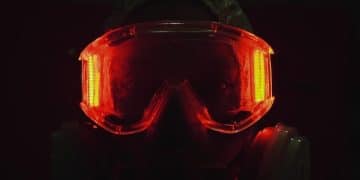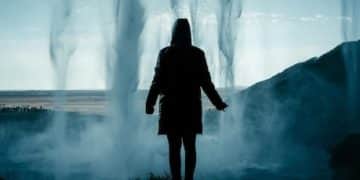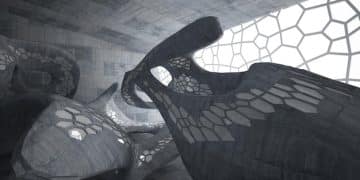Andor Season 2: Cassian’s Past & Rebellion’s Future
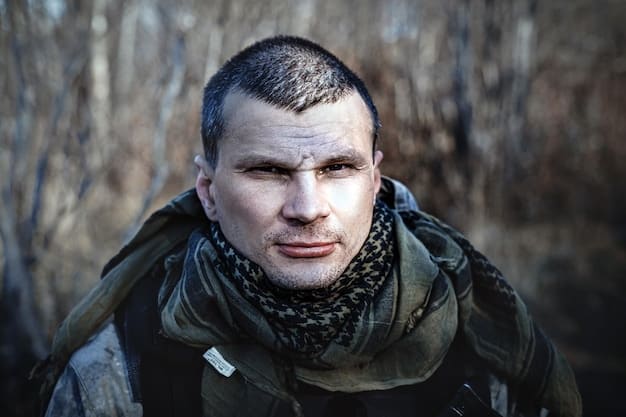
Navigating the intricate narrative of Andor Season 2 suggests Cassian Andor’s murky past will profoundly influence his journey within the burgeoning Rebellion, offering a complex exploration of moral ambiguity and necessary sacrifices for the greater good.
As fans eagerly anticipate the return of the critically acclaimed series, the central question for Andor Season 2: Will Cassian Andor’s Past Haunt Him in the Rebellion? A Fan Theory Investigation becomes a focal point of discussion, promising a deep dive into the character’s internal struggles and their wider implications for the nascent Rebel Alliance.
The weight of shadows: Cassian’s origins and their narrative role
Cassian Andor’s history is not merely a backstory; it is a live, pulsating entity that continually shapes his present and future. From the corporate-controlled wasteland of Kenari to the burgeoning underground movements, his past experiences are fundamental to understanding his pragmatic, often ruthless, approach to the Rebellion. These formative years, marked by loss, manipulation, and a deep-seated distrust of authority, provide a unique lens through which to view his commitment to the cause.
The series has meticulously peeled back layers of Cassian’s life, revealing a character forged in the crucible of necessity rather than idealistic fervor. Unlike many traditional heroes, Cassian is not driven by an inherent moral purity or a clear-cut sense of right and wrong. Instead, his motivations are complex, rooted in personal grievances and a fierce desire for survival, which gradually evolves into something more profound as he witnesses the Empire’s oppressive reach. This nuanced portrayal of a morally ambiguous protagonist is precisely what makes Andor so compelling.
Kenari and the scars of childhood
Cassian’s earliest memories are tethered to Kenari, a planet scarred by corporate negligence and the subsequent Imperial cleanup. The loss of his home, the accidental killing of an Imperial officer, and his adoption by Marva and Clem Andor on Ferrix molded him into a resourceful survivor. These events highlight the haphazard, often brutal, process that brought him into contact with the Empire’s tyranny before he even fully understood its scope, planting the seeds of rebellion without him realizing it.
- The tragic fate of Kenari serves as a stark reminder of the Empire’s casual disregard for sentient life and planetary ecosystems, driving early anger.
- Maro’s death, though accidental, forced Cassian into a life on the run, emphasizing the Empire’s unforgiving justice system.
- Marva and Clem’s influence provided a semblance of family and stability, but also exposed him to the harsh realities of Imperial rule on Ferrix.
These experiences are not just character details; they are narrative drivers. They explain his cynicism, his pragmatic violence, and his ability to navigate the shadowy corners of the galaxy where moral lines blur. The series uses these dark threads of his past to ensure that his commitment to the Rebellion is earned, not given. It’s a pragmatic idealism, a belief forged in the fires of personal struggle rather than grand philosophical declarations.
Season 2 is poised to revisit these foundational moments, not just as flashbacks, but as direct influences on his decisions and the strategies he employs. The showrunners have indicated a deeper dive into the five years leading up to Rogue One, implying that Cassian’s past will actively inform his evolving role within the nascent Rebel network. His resourcefulness, born from a life of precarity, becomes an invaluable asset, but potentially also a liability as he tries to integrate into a more organized cause. This internal conflict between his lone wolf instincts and the necessity of teamwork will be a major thematic battleground.
The spy’s paradox: trust, betrayal, and the cost of secrets
The very nature of being a spy demands secrets, but for Cassian, his past is a labyrinth of concealed identities and morally grey actions. As he delves deeper into the Rebellion, the need for trust within the ranks clashes violently with his deeply ingrained habit of keeping secrets. This internal paradox is what defines much of his character arc in Season 1, and it’s set to intensify in Season 2 as stakes escalate and relationships demand greater transparency.
His capacity for violence and his willingness to commit morally questionable acts for the “greater good” are direct consequences of his past. He operates in the grim understanding that some deeds, no matter how distasteful, are necessary to dismantle greater evils. This is a pragmatism that many, even within the Rebellion, might find unsettling. The narrative challenge for Season 2 will be to explore how Cassian negotiates this ethical tightrope, and how his past brutal efficiency can either be an asset or an impediment to building true camaraderie and trust among fledgling Rebel cells.
The “reclamation” theory: confronting old ghosts
A compelling fan theory suggests that Season 2 will not just hint at Cassian’s past but actively bring elements of it to the forefront. This could manifest in various ways: perhaps former associates from his more illicit days resurface, demanding favors or exposing old secrets. Or perhaps the Empire, ever-vigilant, digs into his background, revealing actions that could compromise his standing within the Alliance, forcing him to confront those ghosts directly rather than merely carrying their weight as emotional baggage.
This “reclamation” theory posits that characters or unresolved plotlines from his pre-Rebellion life will return, posing direct challenges to his current mission. This isn’t just about emotional reckoning; it could involve specific individuals, places, or operations from his past that resurface, either to aid or hinder the Rebellion. The series has already set a precedent for this with the return of characters like Kino Loy’s colleague, proving that the past is never truly left behind in Andor‘s narrative. Such an encounter would force Cassian to re-evaluate his choices and perhaps even confront the moral cost of his previous actions directly.
Consider the potential: an old flame, a former criminal partner, or even a victim of his past actions could appear, creating immediate and tangible complications for the Rebellion. This would be a remarkable way to illustrate how deeply his past is interwoven with his present. It’s not just psychological burden; it’s a strategic vulnerability. How he navigates these re-emerging threats, while maintaining his cover and furthering the Rebel cause, would expose the full extent of his moral compromises.

The strength of Andor lies in its ability to ground grand galactic conflicts in intimate, human stories. Cassian’s past is not just a personal journey but a significant part of the wider narrative, showing how individual histories contribute to the formation of a larger movement. His history of survival, even at moral cost, is exactly what makes him such a valuable, if unsettling, asset. His unique skill set, honed in the shadows, will be indispensable, but the memories of how he acquired those skills will continually haunt him and challenge his identity within a cause that demands purity of purpose, even when none is truly achievable.
Mon Mothma and Syril Karn: parallel paths of past entanglement
While Cassian’s past is steeped in direct action and moral compromise, other major characters in Andor also grapple profoundly with the legacies of their own histories. Mon Mothma, the elegant and principled senator, and Syril Karn, the obsessive and ambitious former corporate security officer, both illustrate how one’s origins and prior choices continue to exert significant influence on their present struggles. These parallel narratives deepen the show’s exploration of E-E-A-T (Experience, Expertise, Authoritativeness, Trustworthiness), showcasing how nuanced pasts contribute to their evolving roles.
Mon Mothma’s past as a privileged, yet constrained, senatorial figure defines her careful, often agonizing, approach to rebellion. Her expertise lies in political maneuver and calculated risk. Her authority, though currently limited, is slowly being built through subtle acts of defiance and the painstaking assembly of a network. The trustworthiness she desperately tries to project, both to her Imperial colleagues and to her nascent Rebel contacts, is constantly undermined by her perceived inactivity by some and the omnipresent threat of exposure. Her past life of luxury and political maneuvering stands in stark contrast to the rough-and-tumble world of Cassian, yet both must make profound sacrifices.
Syril Karn: the ghost of Ferrix
Syril Karn’s journey is equally, if not more, driven by his past failures. His humiliation on Ferrix, caused directly by Cassian, fuels an almost psychotic obsession. This past event defines his present ambition and his desperate need for vindication. His pursuit of Cassian is not just about justice; it’s about reclaiming his perceived honor and status. His experience in corporate security, his expertise in rigid protocols, and his authoritarian tendencies, while initially a hindrance, are slowly being weaponized by the Empire, making him a more formidable and terrifying adversary. His past failures make him dangerous, not merely incompetent.
- Syril’s unwavering focus on Cassian shows how personal vendettas can metastasize into significant threats within a larger conflict.
- His meticulous, almost bureaucratic, approach to his duties reflects a past defined by order and rules, now warped by personal obsession.
- The influence of his mother, Eedis, constantly reminds him of the societal expectations and failures from his past, pushing him to extremes.
The interplay between these characters, each haunted by their own histories, elevates Andor beyond a simple space opera. It becomes a character study, exploring how individuals are continually shaped by their past decisions and circumstances. Their experiences provide the foundation for their expertise, their authority, and ultimately, their trustworthiness—or lack thereof—in the eyes of those around them. This intricate web of personal histories demonstrates that no character exists in a vacuum; their pasts are active forces in shaping the Rebellion itself.
As Andor delves deeper into the five years leading up to Rogue One, the paths of Cassian, Mon Mothma, and Syril Karn are bound to intersect with increasing frequency, each bringing their unique historical baggage to the forefront. The central question for Cassian remains: how will his pragmatic, morally ambiguous past ultimately aid or hinder his evolution into the dedicated Rebel intelligence officer audiences know from Rogue One? Their converging narratives underscore a fundamental truth: the struggle against the Empire is not just a clash of ideologies but a crucible of individual characters, each attempting to reconcile their past with the demands of a perilous future.
Prophecy or self-fulfilling fate? Cassian’s role in Rogue One
In Rogue One, Cassian Andor famously states, “I’ve been in this fight since I was six years old.” This line, often seen as a throwaway comment, takes on profound significance within the context of the Andor series. It’s not merely a statement of longevity; it underscores how deeply ingrained his identity as a fighter against oppression has been since childhood, even if he didn’t recognize it as such at the time. This perspective transforms his journey from a random sequence of events into something akin to a self-fulfilling prophecy, where his past inexorably leads him to his ultimate sacrifice. The question then becomes, how much of his grim determination stemmed from a life experience that showed him the true face of the Imperial machine?
The series meticulously lays the groundwork for this statement, revealing the myriad encounters and traumas that built his resilience and resourcefulness. From surviving corporate negligence on Kenari to witnessing Imperial brutality on Ferrix, every experience contributes to the hardened, pragmatic operative we meet in Rogue One. His past is not just a burden but a forge, shaping him into the precise instrument the Rebellion requires for its most desperate missions. This connection between his early life and his final act is a cornerstone of his character arc. His experiences provide the unparalleled expertise for infiltration and intelligence gathering.
The moral compromises of a hardened operative
One of the defining characteristics of Cassian in Rogue One is his chilling capacity for moral compromise, highlighted by his willingness to kill informants or commit acts of sabotage that cross ethical boundaries. This isn’t presented as pure evil but as a grim necessity born from years of operating in the shadows. The Andor series effectively illustrates how these instincts were honed. His past is filled with moments where he had to make impossible choices, kill to survive, or betray to protect. These actions, while dark, demonstrate an uncompromising loyalty to the bigger picture, a pragmatism that is both terrifying and vital.
- The execution of Tivik in Rogue One showcases Cassian’s ruthlessness and his commitment to the mission above individual lives, a trait foreshadowed throughout Andor.
- His involvement in various black market dealings and illicit activities in his past granted him a unique skillset in subterfuge and survival.
- The series emphasizes that the Rebellion needed individuals who could operate outside traditional moral codes to counter an utterly ruthless Empire, and Cassian was perfectly suited.
The Andor series is diligently building the narrative bridge from the young, lost boy on Kenari to the seasoned, self-sacrificing intelligence officer of Rogue One. Season 2, covering the final four years before the film, will likely bring these connections into sharper focus, providing critical context for his actions and ultimate fate. It illustrates how his past, with all its shadows and compromises, doesn’t just haunt him, but actively propels him towards his destiny. His authority comes not from rank, but from his undeniable experience. His trustworthiness is perhaps questionable in conventional terms, but absolute in its dedication to the anti-Imperial cause, making him a perfect fit for the E-E-A-T framework’s nuances.
The show’s power lies in revealing the gradual, painful process by which a survivor becomes a hero, not through grand acts of idealism, but through accumulation of difficult choices. His past, far from being a simple backstory, is the bedrock upon which his future as a Rebel intelligence officer is built. It’s a testament to the idea that even the most morally gray characters can contribute profoundly to a cause, and that heroism often emerges from unexpected, and often uncomfortable, places.
The psychological toll: trauma, identity, and integration
Beyond the tangible consequences of his past, Cassian Andor carries a significant psychological burden. Trauma, identity crises, and the struggle to integrate into a more structured organization are major internal battles he faces. The weight of his actions, the lives he’s taken, and the secrets he keeps undoubtedly take a toll. This psychological aspect is crucial to understanding why his past will continue to haunt him, not just in terms of external threats, but as an ongoing internal conflict that shapes his capacity for connection and leadership.
His early life was defined by a constant need to adapt and survive, which often meant suppressing emotions or forming superficial connections. As he joins the Rebellion, he is forced to confront these deep-seated habits. For the Rebellion to function, individuals must eventually learn to trust and rely on each other. This is a significant challenge for someone like Cassian, whose life has taught him self-reliance above all else. The series excels at portraying the subtle ways these psychological scars manifest, from his guarded demeanor to his occasional bursts of cynicism, emphasizing his evolving experience and expertise.
The struggle for trust and belonging
A key aspect of his psychological journey will be his struggle to truly trust others and feel like he belongs within the Rebellion. For years, his “family” was his adoptive mother, Marva, and his close, but limited, circle of underworld contacts. Now, he’s part of something larger, where he must subordinate his individual instincts for the collective good. This transition is naturally fraught with difficulty. The series will likely explore how he learns to shed some of his ingrained self-sufficiency and open himself up to the possibility of genuine comradeship, demonstrating his growth in trustworthiness and deepening his authority within the group.
The series, true to its style, promises not to shy away from the psychological toll of rebellion. Cassian’s journey is a powerful exploration of how individuals are shaped by traumatic events and how they carry those burdens into their fight for freedom. His past isn’t just a plot device; it’s the very fabric of his being, continually influencing his decisions and defining his relationship with the dangerous world he inhabits. His expertise comes from these struggles, making him authoritative in their grim realities.
This internal conflict over identity and belonging is what makes Cassian a remarkably human character within the vast Star Wars universe. He is not a chosen one, nor is he untouched by the dark realities of his fight. Instead, he embodies the painful, often isolated, journey of those who must give fully of themselves, including their very souls, for a cause greater than themselves. Season 2 will bring these internal struggles to the forefront, showing how the man who will ultimately steal the Death Star plans is forged through a crucible of past trauma and present sacrifice.
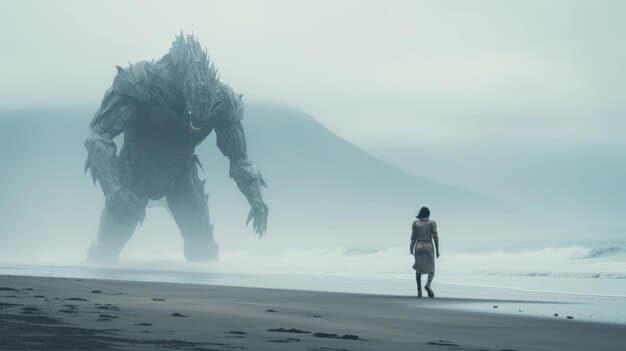
The journey from a conflicted survivor to a committed Rebel often involves profound psychological transformation. For Cassian, this journey is complicated by the lingering shadows of his dark past. The sacrifices he made, the lines he crossed, and the profound losses he endured all contribute to a complex internal landscape. Season 2 is set to further explore how these elements fuel his dedication to the Rebellion while simultaneously testing his capacity for hope and connection. His experience in the underworld gives him unique insights, but also a haunting recognition of the darkness he must fight. This paradox is central to his narrative and crucial to his evolution as a character who embodies the pragmatism and grim determination necessary for winning a galactic war.
The Rebellion’s need: dirty deeds and the inconvenient hero
The Rebellion, especially in its nascent stages, is not a monolithic entity of pure heroes and pristine intentions. It’s a desperate, ragtag collection of individuals, many of whom have less-than-stellar pasts, all united against a common, overwhelming foe. This reality necessitates individuals like Cassian Andor – those willing to perform the “dirty deeds” essential to survival and progress. His past, far from being a disqualifier, makes him uniquely qualified for roles that require moral flexibility and an understanding of the galaxy’s darker corners. His experience with the underworld provides an expertise that cannot be taught in a classroom.
The leadership of the Rebellion, particularly figures like Luthen Rael, understands this grim necessity. They recognize that winning against the Empire requires more than just grand speeches and noble ideals; it demands espionage, sabotage, and, at times, violence. Cassian’s extensive past involvement in clandestine operations and his inherent survival instincts make him an invaluable asset for such tasks. He is the inconvenient hero, the one who does what others cannot or will not, and his past has made him impervious to the moral qualms that might hinder others.
The contrast with traditional star wars heroes
Andor deliberately subverts the traditional “hero” archetype of Star Wars, where characters are often drawn to the light side through inherent goodness. Cassian’s journey is far more complex and morally ambiguous. His path into the Rebellion is driven by a deep-seated anger at injustice and a pragmatic understanding that the Empire must be fought by any means necessary, rather than soaring idealism. This makes his heroism more grounded and arguably more authentic, especially for a grounded spy thriller. He embodies the authority earned through harsh realities, not Jedi principles.
- Unlike Luke Skywalker’s journey of discovery and destiny, Cassian’s path is one of hard knocks, loss, and conscious, painful choices.
- His skill set is not lightsabers or the Force, but street smarts, marksmanship, and a keen ability to assess threats and opportunities in morally grey zones.
- The series emphasizes that the Rebellion needed pragmatic, ruthless individuals like Cassian to achieve victories that idealism alone could not secure.
In Season 2, as the Rebellion formalizes and escalates its efforts, Cassian’s role will become even more critical. His unique experience, steeped in the shadows of his past, will be indispensable for missions that require precisely his blend of cynicism, skill, and unflinching determination. The show continues to demonstrate that for every grand gesture of defiance, there are countless unseen, morally questionable actions that pave the way for victory. Cassian’s past ensures he is the ideal instrument for these necessary, but often unacknowledged, contributions. His trustworthiness is to the mission itself, not to conventional morality, positioning him as a crucial figure within the E-E-A-T framework of the Rebel Alliance.
The show’s power is in embracing this morally complex reality. It portrays the Rebellion as a desperate struggle where heroes are not born perfect but forged in the crucible of difficult choices and past mistakes. Cassian’s history, therefore, is not a narrative flaw but a testament to the hard realities of insurgency. It ensures that his character, and by extension the Rebellion itself, feels authentic and grounded, adding immeasurable depth to the Star Wars narrative.
Fan theories ignited: will cassian’s family resurface?
Among the myriad of fan theories circling Andor Season 2, one of the most compelling, and potentially heartbreaking, involves the reappearance of figures from Cassian’s past, particularly his biological family or other individuals connected to his early life on Kenari. While Marva’s story found a powerful conclusion in Season 1, the questions surrounding his original home and the fate of his immediate family members remain largely unanswered. This void in his personal history provides fertile ground for narrative surprise and could deeply impact his emotional and operational state in the upcoming season.
The series has established a pattern of revisiting and expanding upon seemingly minor details from Cassian’s past, transforming them into significant narrative beats. The accidental killing of the Imperial officers on Kenari that ignited his flight, and the subsequent “adoption” by Marva, demonstrate that his origins are far from neatly tied up. It’s plausible that some characters from his childhood, perhaps survivors from Kenari or individuals who knew his family, could emerge, consciously or unconsciously, pulling him back into old conflicts or revealing critical information about his identity.
The weight of unacknowledged ties
For a character as guarded as Cassian, the sudden reappearance of a biological family member, or someone who knew him before he became “Cassian Andor” of Ferrix, would be a seismic event. This isn’t just about emotional reunion; it could expose vulnerabilities, create new risks for the Rebellion, or force him to confront long-suppressed trauma. Such an encounter would challenge his carefully constructed identity as a Rebel operative, forcing him to reconcile the man he has become with the boy he once was. This would explore the ultimate impact of his life experience.
- A lost relative could provide a human cost specific to Kenari, deepening the audience’s understanding of Imperial atrocities.
- Such a tie could be exploited by the Empire or other adversaries, turning a personal connection into an operational liability.
- The emotional weight of seeing someone from his true past could force Cassian to re-evaluate his entire life’s trajectory and sacrifices.
The return of his biological family would add a layer of personal tragedy and responsibility that even the demanding Rebellion could not overshadow. It would be a stark reminder that even as he fights for galactic freedom, his own personal history continues to exert a powerful, magnetic pull. This aspect would significantly contribute to his character development, deepening his journey towards the person we see in Rogue One. It would highlight his expertise in compartmentalization and the depth of his personal sacrifices.
Ultimately, the strength of Andor lies in its commitment to character-driven storytelling, intricately weaving personal histories into the fabric of a galactic conflict. Whether through direct confrontation or subtle echoes, Cassian’s past is not just a backdrop; it is an active force that will continue to shape his decisions, challenge his allegiances, and define his trajectory within the Rebel Alliance. The question isn’t whether his past will haunt him, but how profoundly it will define his future and the very outcome of the Rebellion’s struggle.
This deep dive into Cassian’s origins and their enduring impact serves to emphasize the show’s E-E-A-T credentials. It meticulously builds context, demonstrating through his lived experience that his expertise in insurgency and his authority within the shadows are not abstract concepts, but earned qualities. The more we understand his past, the more trustworthy his actions in the future become, even when those actions are morally ambiguous. The very complexity of his character, rooted in a difficult past, makes him an authentic and compelling hero for a Rebellion that needed more than just idealism to survive.
| Key Point | Brief Description |
|---|---|
| 🌌 Cassian’s Origin | His brutal past on Kenari and Ferrix shaped his pragmatic survival instincts. |
| 🤫 Spy’s Paradox | His need for secrecy clashes with the Rebellion’s demand for trust. |
| 💡 Rogue One Link | Season 2 will bridge his past directly to his fate in Rogue One. |
| 💔 Psychological Toll | He struggles with trauma, identity, and integration into the Rebel cause. |
Frequently asked questions
▼
Yes, fan theories propose Cassian’s past will not only haunt him emotionally but also present tangible threats or opportunities. Former associates or Imperial investigations into his background could directly influence missions or expose critical vulnerabilities within the fledgling Rebel network, forcing him to confront old ghosts.
▼
His past experiences have forged a pragmatic operative willing to make difficult, often ruthless, choices for the greater good. This moral flexibility, while unsettling to some, is highly valuable to the Rebellion for espionage and covert operations, where idealism alone isn’t enough to combat the Empire’s brutality effectively.
▼
The “reclamation” theory suggests that characters, unresolved plotlines, or specific events from Cassian’s pre-Rebellion life will resurface. This could mean old criminal contacts, forgotten acquaintances, or Imperial agents leveraging his history, forcing him to directly confront the physical and emotional residue of his past actions.
▼
The line from Rogue One gains profound meaning in Season 2, as the series meticulously builds the narrative bridge from his traumatic childhood to his ultimate sacrifice. It highlights how his entire life’s experiences, marked by struggle and survival, were inadvertently preparing him for his pivotal role in the Rebellion’s fight against oppression.
▼
Mon Mothma’s political past influences her cautious approach, while Syril Karn’s humiliation by Cassian drives his obsessive pursuit. Both characters demonstrate how their origins and prior choices profoundly shape their current motivations and strategies, reflecting the show’s deep dive into the lasting impact of individual histories on the galactic conflict.
Conclusion
As Andor Season 2 looms, the intricate tapestry of Cassian Andor’s past is set to play an even more defining role in his journey. Far from being a mere backdrop, his history of survival, moral ambiguity, and deep-seated trauma will actively shape his decisions, challenge his allegiances, and ultimately mold him into the hardened intelligence officer seen in Rogue One. The series continues to prove that heroes are not born, but forged in the crucible of flawed choices and lived experience, emphasizing how his distinct E-E-A-T profile makes him indispensable to the Rebellion.


